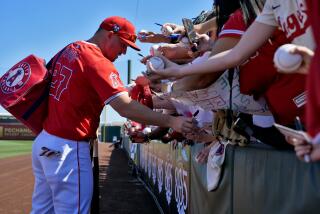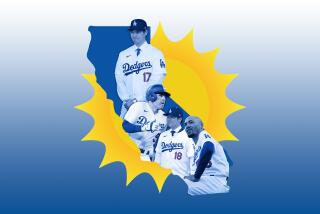Spree Clinic
We live in a sporting age in which we celebrate the home run and worship the men who hit them. No one minds winning, but hitting the home run gets you on ESPN, gets you on the cover of the video game, gets you tens -- or hundreds -- of millions in free agency, and gets you the girl too. Chicks dig the long ball, after all.
As the Angels completed their magical march to the World Series championship last year, their most enthusiastic fans included high school and college coaches across America. As a refreshing antidote to the me-first sluggers at all levels, the team-first Angels conducted a daily baseball clinic on national television last October, culminating in a World Series that they won and Barry Bonds did not.
David Eckstein executed the hit-and-run. Garret Anderson tagged from first base to second on a fly ball to left field. Darin Erstad triggered a double steal. Scott Spiezio and Orlando Palmeiro drew eight pitches each in consecutive at-bats.
“When I think of baseball the way it’s supposed to be played, that’s what I see,” said the first-year coach at San Diego State, future Hall of Famer Tony Gwynn. “They’re the only team I can honestly say I would like my guys to play like.”
Easier said than done, a lament echoed by coaches around the nation. While the Angels undeniably proved old-fashioned baseball can succeed in the new millennium, even the potential thrill of victory might not persuade this generation of young players to sacrifice the glory of the home run for the selflessness of the sacrifice bunt.
“When you’ve got a society focused on how far guys can hit the ball out of the ballpark, it’s a tough one to sell,” Gwynn said.
Gwynn worked as an ESPN analyst last summer and said he had to lobby for “Baseball Tonight” segments on the Angels. No lobbyists were necessary for endless replays of home runs by Bonds, Alex Rodriguez and Sammy Sosa.
“When you watch ESPN, you see the slam dunk and the home run,” said Tom Kennedy, father of Angel second baseman Adam Kennedy and baseball coach at Riverside North High from 1973 to 1999. “You can see those kinds of things ingrained in kids.”
Said Angel bench coach Joe Maddon: “They think it’s cool to hit a home run. Unfortunately, not everybody can. Some players have just enough power to be a bad hitter. They may try to hit the long ball and never develop the hitting ability they might have had otherwise.”
No longer are hitters shamed by gobs of strikeouts. Sluggers are forgiven.
The Angels refused to concede to the modern era. No Angel hit more than 30 home runs last season, but the Angels struck out the fewest times of any team in the major leagues, with the highest batting average. Put the ball in play, and good things can happen.
In their 10-hit inning against the Minnesota Twins in the American League championship series, the Angels collected nine singles, and a home run from Kennedy. In their 10-hit inning against the New York Yankees in the division series, Erstad, Spiezio, Tim Salmon and Benji Gil all hustled from first base to third on singles.
Gwynn raved about one play in the Angels’ first postseason victory, when 230-pound designated hitter Shawn Wooten charged from first base to third, on a single to perennial Gold Glove center fielder Bernie Williams.
“Of all the things they did, the most impressive thing to me was the way they ran the bases,” Gwynn said. “There’s nothing wrong with hitting a three-run home run. But that doesn’t stop you from hustling. Even if you can’t run fast, you can be a smart baserunner.”
Since 1984, Maddon has operated a youth baseball camp in Mesa, Ariz.
“I have a soap box there. I’ve always preached this stuff,” he said. “Now, if you watch TV, you can see that it absolutely works. You can’t spell the word ‘fundamental’ without the words ‘fun’ and ‘mental.’ ”
And that hints at the reason the Angels cite for their success -- not the discovery of revolutionary baseball theory, just a teamwide embrace of old-school ball and a belief that practice really does make perfect.
“It’s the work ethic. I think that’s the more important concept to get across,” Eckstein said. “It’s a challenge to get the kids in this generation to buy into that. They all want to be the hero, without working hard. They don’t understand why it doesn’t happen when they fail.
“Work ethic is a day-in, day-out process. They want it to be fun. They want to sit at home and play video games and then show up for the game and hit a home run. If you’re serious about taking your game to the next level, the fun part is doing well and winning. That’s the biggest confusion -- what is fun?”
It could be fun, for instance, for prep or college players to confuse batting practice with a home run derby, to hack away to see who can hit the most homers, or the most impressive ones. The Angel players treat batting practice as a daily refresher course in dropping a bunt, lofting a sacrifice fly, cueing a ground ball toward second base to advance a runner, even getting the proper leads and jumps while running the bases.
Yet, without trust in teammates and a firm commitment from them, even the most disciplined practice hitters tend to abandon that discipline during games. A hitter might be willing to sacrifice his statistics to advance a runner from second base to third, but the next guy up better be willing to sacrifice his statistics to get that runner home.
“You can’t have just some guys do it. You have to have everybody do it,” Erstad said. “That’s not easy to accomplish, but we were able to do it.”
Said Tom Kennedy: “From a coach’s eye, the main thing I appreciated was their willingness to do the little things without their egos getting in the way.
“Some guys flat out won’t listen. Look at all the teams with really good players but, behind the scenes, with a lack of total team commitment.”
Coaches talk, and kids nod. But in the minds of kids conditioned to believe homers translate into college scholarships and pro contracts, the lessons of the sacrifice bunt dissolve into visions of the home run.
Inevitably, Gwynn said, a young player will bat with a runner on second, fully aware his coach expects a ground ball toward second base so the runner can take third. And, almost as inevitably, that player will want to be the hero, will vow to drive the runner in -- and will pop up a pitch perfectly suited for that ground ball.
“I see it every day,” Gwynn said.
In this relentlessly individualistic culture, the Angels’ collective triumph caught the fancy of fans in search of something entirely different.
Said Maddon: “Didn’t we become more popular? Didn’t people think it was nouveau and cool to play like the Angels? That’s what I heard all winter.”
And then Maddon chuckles. The Angel Way? Everything old is new again.
“The Angel way is the way it was written many years ago,” he said. “It’s not 21st century. It’s turn-of-the-previous-century baseball.
“It’s old stuff being done right. Any coach -- high school, college, whatever -- would want their team to play like this team played last year. But you have to have the right mix of players to get that done. We had a group of selfless players.”
More to Read
Go beyond the scoreboard
Get the latest on L.A.'s teams in the daily Sports Report newsletter.
You may occasionally receive promotional content from the Los Angeles Times.






